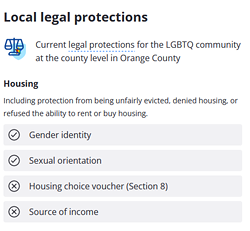Adobe
Landlords are prohibited from rejecting tenants in Orange County because they use a government housing voucher to pay rent, but online rental listings show they do it anyway.
Discriminating against renters based on their use of government rental assistance to pay for housing is a problem that plays out nationally, with disproportionate effects on women and people of color.
This form of discrimination can be direct (“We don’t accept vouchers”) or indirect (“You just wouldn’t be comfortable here”).
There’s no federal or state law in Florida that prohibits it, although a handful of city and county governments, including Orange County, have taken a stand against it.
Earlier this year, Orange County adopted new fair housing protections that prohibit local landlords and property managers from discriminating against people who use government assistance to pay rent.
You’re not obligated to accept tenants on government assistance, but you also can’t flat-out reject them on account of that either.
Orlando Weekly has found, however, that a number of real estate companies continue to do so, blatantly flouting the county’s fair housing protections by declining to accept Section 8 tenants.
Section 8, also known as the Housing Choice Voucher program, is a form of federal rental assistance that subsidizes housing for low-income renters by directly paying landlords.
Under Orange County’s fair housing law, it’s unlawful to reject tenants based on any lawful source of income, which includes Section 8 as well as income from a job, alimony, child support, retirement benefits, and vouchers for low-income veterans.
The policy also prohibits restricting a Section 8 tenant’s housing options in any way, or discouraging them from renting on account of where their rent money comes from.
Not everyone’s gotten the memo.
As of publication, Orlando Weekly identified over two dozen discriminatory listings on Zillow, Realtor.com, and Apartments.com, offering some variation of “No Section 8.”
Most were listed by real estate companies, or individual realtors. A handful were listed by individual property owners.
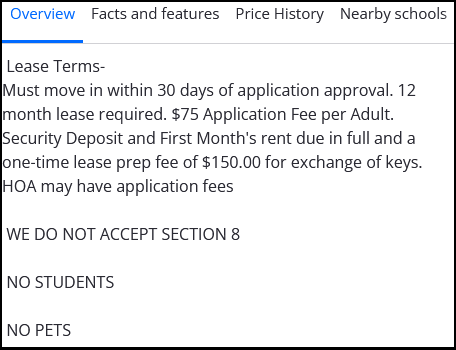
Zillow
A rental listing in Orange County, Florida, listed by Orlando-based company Homevest Management. Screenshot taken Aug. 3, 2023.
When questioned about these listings, the county’s Office of Tenant Services, tasked with addressing issues of tenant and landlord rights, didn’t confirm they’d look into it.
Instead, Orlando Weekly was told the office doesn’t have the resources to do anything about it.
“Unfortunately, the office does not have the staff available to sweep the online listings,” Amy Michaels, the office’s administrator, told Orlando Weekly in an emailed statement, sidestepping a phone interview.
Established in March of this year, the office today has three staff members: one person who goes out into the community to provide education and outreach on fair housing laws, and two staffers who take calls and emails and provide case management.

Frank Weber/Orange County
Orange County Mayor Jerry Demings, county commissioners, and county staff celebrate launch of new Office of Tenant Services on March 1, 2023.
Operating on a budget of less than $1 million, the office is empowered to answer questions about tenants’ rights and to field complaints from residents within 90 days of any alleged discriminatory action. If there’s evidence to suggest discrimination did occur, they can then pass those along to the county’s housing division for further investigation.
But this highlights a catch: Their enforcement relies chiefly upon a complaint process initiated by tenants, who thereby become responsible for reporting discriminatory behavior.
Even more, the burden of proof (evidence to support the allegation of discrimination) also rests on the complainant. Meaning, if you don’t have verifiable evidence to support your allegation, you don’t really have a case.
Unsurprisingly, in the five months their office has been open, Michaels confirmed they haven’t received a single verified complaint of discrimination from a Section 8 tenant.
This might be due to a broader lack of awareness about the new policy. It’s also difficult to figure out how to file a complaint in the first place.
The Office of Tenant Services, a “one-stop shop” for landlords and tenants, lists three resources on its website to report housing discrimination: the U.S. Department of Housing and Urban Development, the Florida Commission on Human Relations, and the City of Orlando Human Relations Commission.
Problem is, none of those three agencies are empowered to investigate Section 8 discrimination complaints, because there’s no state or federal law prohibiting it.
This still leaves tenants with a few options.
Mitchell Glasser, manager of the county’s housing division (which also fields complaints), told Orlando Weekly that if their agency can’t reach a resolution with the landlord over a discrimination complaint, the tenant has the right to take it to civil court.
Zillow says, ‘Not our problem’
Some rental platforms, like Zillow, have taken a proactive approach towards promoting nondiscrimination policies on listings to help raise awareness among tenants and landlords.
A company spokesperson told Orlando Weekly that Zillow is “committed to ensuring consumers can find a home free of discrimination or bias.”
They add local legal protections to their rental listings. Notably, however, the platform does not include “source of income” as a protected category on Orange County listings.
This isn’t an oversight.
Will Lemke, Zillow’s communications manager, said this was a recent change, and it’s largely due to confusion around a new state law (HB 1417) that dissolved dozens of local housing laws across the state, including Orange County’s tenant bill of rights and fair notice ordinance, which had required a minimum 60 days notice from landlords of any lease termination or rent increase of over 5%.
“After the passage of HB 1417 in Florida, we made the determination that we cannot give prospective renters a false sense of security by informing them they have legal protections against source of income discrimination while the enforceability of the local protections are in doubt,” Lemke told Orlando Weekly in an emailed statement.
The state law’s passage was celebrated by pro-landlord groups like the Florida Realtors, and supported by the Florida Apartment Association, a major industry group whose local affiliates have lobbied elected officials against source of income discrimination policies across the state.
Both groups also sued Orange County last year over a rent control referendum, and donate generously to the campaign funds of local and state politicians on both sides of the aisle.
As of a result of the law, Zillow has opted to err on the side of caution.
After all, there are other communities in Florida that have had to repeal their source of income anti-discrimination protections as a result of the law, which preempts all local regulations of residential tenancies to the state.
It’s only because of a very wonky technicality that the Orange County government has not.
But if you’re on a Zillow listing, you wouldn’t know it.
‘No Section 8’: Discrimination persists
While there’s no federal law prohibiting landlords from rejecting tenants based on their use of Section 8, about a dozen states — not including Florida — have opted to fill in the gap by enacting their own statewide source of income nondiscrimination protections. So have over 75 cities and counties nationwide.
That includes Orange County, a rapidly growing area of Central Florida whose economy relies on the labor of a largely low-wage hospitality and tourism workforce.
Still, empowered by ignorance or blatant disregard for the county’s fair housing laws, real estate companies — and some individual listers — have continued to list rentals online that are explicitly discriminatory.
Homevest Management, a property management company based in Orlando, has at least two rental listings online that state: “WE DO NOT ACCEPT SECTION 8.
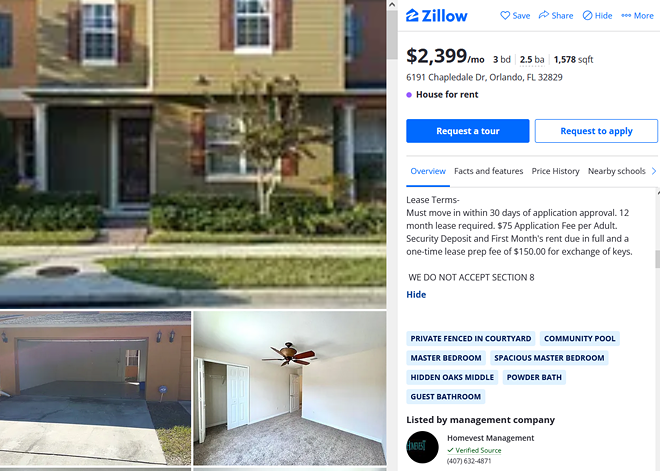
Zillow
A rental listing in Orange County, Florida, listed by Orlando-based company Homevest Management. Screenshot taken Aug. 3, 2023.
Another five discriminatory listings from Homevest, discovered by Orlando Weekly earlier this month, have since gone off-market (Orlando’s rental market is red-hot, after all).
The company did not return our emailed request for comment on whether they’re aware that language on their listings violates local fair housing law.
Another two discriminatory listings (“No Section 8”) were posted by a company called RealSource Property Management LLC, which is well aware of Orange County’s anti-discrimination policy.
It’s posted on their website, along with the county’s now-defunct tenant bill of rights ordinance.
Prior to July 1, when the new state preemption law took effect, that ordinance required most landlords to provide a “Notice of Tenant Rights” to Orange County renters ahead of move-in, among other things. Now, thanks to that new state law, it’s no longer enforceable.
Then there are some companies, like Orlando Property and Realty Management, that are less direct, and simply clarify in their listings that their properties are “not approved” or “not eligible” for Section 8.
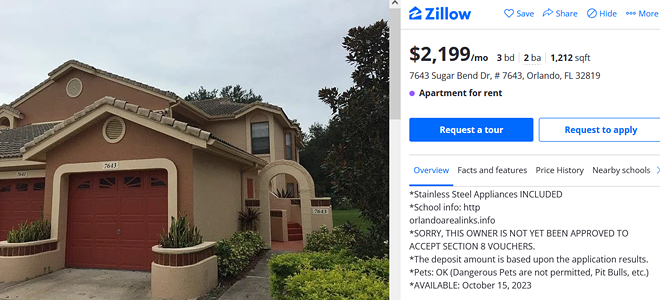
Zillow
A rental on Zillow listed by Orlando Property and Realty Management. Screenshot taken Aug. 14, 2023.
This is a reference to a mandatory inspection that’s required by agencies that distribute vouchers to make sure that housing units for Section 8 tenants meet basic health and safety standards.
People with Section 8 vouchers are allowed to rent any unit on the private market they want, as long as they can afford to pay their share of the rent — between 30% and 40% of their monthly income.
But the rental unit also needs to be safe. The government (bless its heart) wants to avoid knowingly subsidizing slum conditions for people who are already economically marginalized.
Jorge Acosta Palmer, a local housing attorney with Community Legal Services who works with Section 8 tenants, said claiming a property “is not approved” for the Section 8 program should be cause for concern.
“If they haven’t been approved by Section 8, that usually means that they are not complying with the housing quality standards,” Acosta Palmer told Orlando Weekly.
“That alone is a major red flag.”
He admits it’s also likely they’re just trying to find some way to discourage Section 8 tenants without coming right out and saying so. “It’s just another way for them to try to circumvent the discrimination [prohibition],” he added.
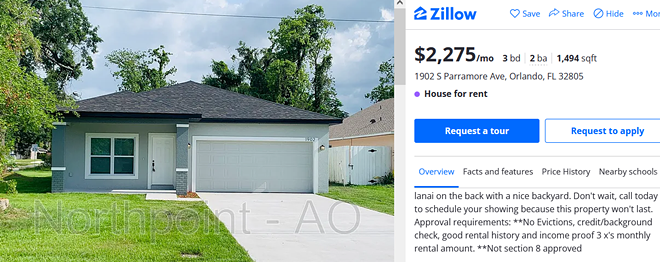
Zillow
A Zillow rental listing from property management company Northpoint AO. Screenshot taken Aug. 14, 2023.
Daniel Teles, a housing research associate for the Metropolitan Housing and Communities Policy Center at the Urban Institute, got the same impression.
“It seems more likely to me that they’re saying that to scare people off than they’re saying like, we have substandard units,” he told Orlando Weekly.
Not all of the listings Orlando Weekly flagged were posted by established real estate companies.
A handful were listed by individuals, whose listings might exist in something of a legal gray area.
That’s because there’s an exception in the county’s fair housing policy for property owners who want to rent a room in their home, and for those who don’t own more than three homes.
However, if they use a real estate management company, agent, listing or similar to manage, lease or market the units, Glasser clarified, “the exception will not apply.”
Not always obvious
If you’re not exempted from the county’s fair housing law, explicitly stating you don’t accept Section 8 online is “a pretty straightforward violation,” says Acosta Palmer.
You can screenshot the ad, he said, and present it as evidence of discriminatory behavior.
If you’re not exempted from the county’s fair housing law, explicitly stating you don’t accept Section 8 online is “a pretty straightforward violation,” said one local housing attorney.
tweet this
But there are also less discernible (and documentable) ways that landlords can discriminate against Section 8 tenants, without just coming right out and saying so.
Landlords will sometimes finding other creative, morally questionable ways to price tenants out.
For instance: Adding junk fees on top of the total rental cost. Screening tenants’ credit scores or eviction history. Charging Section 8 tenants higher rent than others for a unit. Or listing a minimum income requirement that excludes a tenant’s rent voucher.
Most local tenants on Section 8 are working adults with families who make at or around minimum wage, said a supervisor overseeing Orange County’s voucher program in an interview with Orlando Weekly in January.
Minimum wage in Florida is $11 per hour for non-tipped workers, or roughly $22,880 annually working full-time, which isn’t nearly enough to afford even a one-bedroom unit in Orange County.
Average rent has shot up over 30% since early 2020. Homelessness and eviction rates have also increased following the end of pandemic-era eviction moratoriums.
A majority of Section 8 vouchers in Orange County — 75% — are saved for those making at or below 30% of the area median income, equal to $18,450 for an individual or $26,350 for a family of four.
Historically, voucher recipients have had a harder time finding landlords to accept their vouchers, particularly in areas with low poverty and crime, due to stigma and landlords’ frustration with the bureaucracy of the program.
“There are just many landlords that don’t want to take vouchers for a variety of reasons,” Martha Are, executive director of the Homeless Services Network of Central Florida, told Orlando Weekly earlier this year.
“[They] don’t want to deal with the paperwork, don’t want to deal with the inspections, or would just rather rent to people who don’t have any of those strings attached.”
But housing advocates, including nonprofits like the Homeless Services Network, strive to destigmatize the program and to emphasize its benefits both for landlords and Section 8 tenants.
For starters, “You’re looking at guaranteed rent,” said housing attorney Acosta Palmer.
At least 70% of a Section 8 tenant’s rent comes directly from the government each month, consistently. The tenant, who’s also prescreened for eligibility, is responsible for covering the rest — and if they don’t, their voucher could be at stake.
Then there are the benefits of the program for low-income families and the community as a whole. Research suggests the program can help lift families out of poverty and reduce homelessness and housing instability — a problem associated with poorer social and economic outcomes for kids and adults.
But there’s more than just a moral argument, especially if you’re required by local or state law to accept vouchers.
“It makes the program less effective if people are allowed to just turn it [vouchers] down,” said Teles, who co-authored a report on the impact of source of income nondiscrimination laws for the Urban Institute, a nonprofit focused on social and economic policy research.
The goal of the program is to increase high-quality housing opportunities for low-income families. Rejecting program participants is “a significant hindrance” to that, he added.
The trouble with enforcement
While dozens of source of income discrimination laws have been enacted nationwide, actual enforcement of these policies has come under scrutiny.
The Asbury Park Press reported in 2021 that housing discrimination toward Section 8 tenants in the state of New Jersey continued to occur largely unchecked, despite statewide anti-discrimination protections that had been in place since 2002.
A large part of that was tied to lackluster enforcement.
While the state has a federally funded program that directs local agencies to conduct undercover “testing” in order to identify discriminatory landlords, reporting from the Asbury Park Press revealed that the state’s enforcement agency still lacked teeth.
Like in Orange County, the state’s dedicated watchdog for housing discrimination also relied on a tenant-driven complaint process as their primary enforcement strategy.
Locally, the Office of Tenant Services confirmed they rely chiefly on complaints that come in from local residents. They don’t proactively search for evidence of discriminatory behavior.
Teles, with the Urban Institute, acknowledged that they don’t actually have good evidence yet on what makes a strong or weak enforcement system for these laws.
Nonetheless, he said that relying on tenants to take action “is problematic.”
He explained, “If you think about yourself as a tenant, do you really want to go through the process of reporting something and trying to then rent from somebody who doesn’t want to rent to you, when you could just look for a different place?”
Under the county’s fair housing law, enforcement officials have up to 100 days to investigate complaints of housing discrimination that come their way.
But voucher recipients, who can often spend several years on a waitlist just to get that rental assistance, only have 120 days to find a place to rent once they secure the voucher.
If they don’t find a place within that time frame, they risk losing the voucher.
“I think by the time the complaint is done, and any action or enforcement is taken, it’s likely going to be too late,” said Acosta Palmer, the local housing attorney. “They’re going to have to continue to look for housing anyway. So that’s part of the challenge.”
Looking forward
That’s why taking a proactive approach to enforcement, by snuffing out discriminatory behavior ahead of time or disincentivizing it, could “definitely” be helpful, said Acosta.
A relatively simple strategy to accomplish that aim, beyond education and outreach for landlords, could include conducting online sweeps of rental platforms like Zillow.
And it’s been done in Florida before.
The administrative manager of Hillsborough County’s Consumer Protection Services division told public radio station WMNF last year that this was part of their fair housing enforcement strategy.
“There’s a reactive approach that we take in accepting complaints, and we’re also proactive in our outreach and looking for violations of this ordinance,” said Eric Olsen, in reference to a local tenants’ rights law.
When contacted by Orlando Weekly to seek clarification on this process, a Hillsborough County spokesperson declined to set up an interview, directing us to a webpage explaining that, thanks to the new state preemption law (HB 1417), the county is no longer able to enforce the ordinance referenced by Olsen.
But building an enforcement mechanism with teeth isn’t outside the realm of possibility. And occasionally, landlords do face penalties for violating the law.
States like California and New York have filed landmark lawsuits over source of income discrimination in recent years. A watchdog group earlier this year sued 26 landlords and brokers in Newark and New Jersey, where source of income discrimination is prohibited.
Last year, the District of Columbia Attorney General’s office also grabbed headlines for securing a $10 million settlement, the largest-ever civil penalty in a housing discrimination case, tied to a lawsuit brought by Section 8 voucher holders.
Teles acknowledged that publicity about enforcement was often “a bigger priority to these offices” in D.C. and New York, for example, than the severity of the enforcement action.
Still, publicizing enforcement actions, he added, can show the public that this issue is being taken seriously, and it could help deter future violations by landlords.
A well-oiled system for enforcement, however, also requires sufficient funding, and there might also be a learning curve to consider.
“For tenants, for landlords, for counties, it’s something that was kind of an emerging issue,” said Acosta-Palmer, of tackling discriminatory practices towards Section 8 tenants.
Compared to forms of housing discrimination covered by federal and state laws, the blueprint available for enforcing Section 8 nondiscrimination is less clearly established.
If you’re a Section 8 tenant who’s searching for a unit in Orange County, Acosta Palmer emphasized that documenting everything — your interactions with landlords, realtors and property managers — “is key.”
At the same time, he believes the burden shouldn’t rest solely on tenants to report discrimination, and that there can be more done to prevent it from happening in the first place.
“If the county were to make it more of a visible issue, and they were proactive with it, I think it would disincentivize landlords from implementing these practices.”
Subscribe to Orlando Weekly newsletters.
Follow us: Apple News | Google News | NewsBreak | Reddit | Instagram | Facebook | Twitter | or sign up for our RSS Feed


